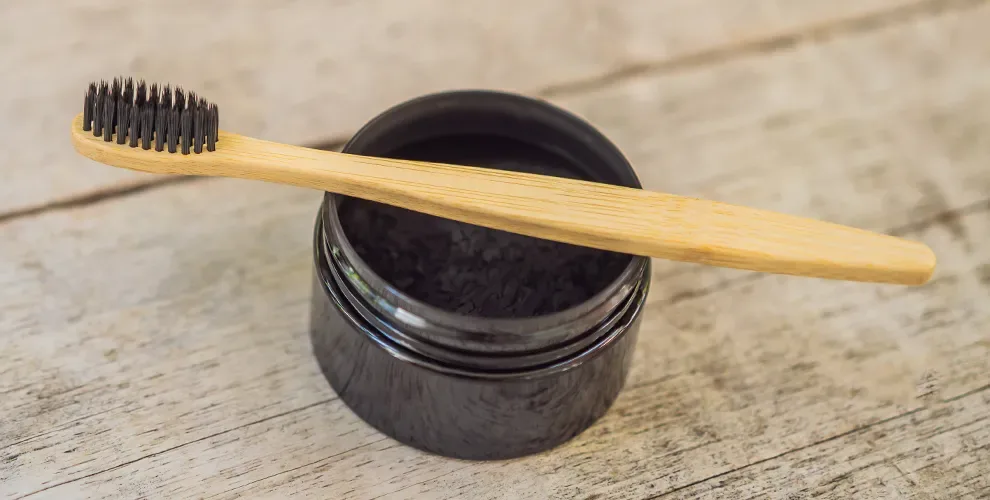Is Charcoal Whitening Bad for Your Teeth Enamel? Know the Risks.

Table of Contents
- Charcoal Teeth Whitening
- Associated Risks
- Scientific Evidence
- Alternatives to Charcoal
- References
Smear something black all over your teeth, rub it in, and rinse. You'll have pearly whites in no time. This is the promise of charcoal whitening products. Use them, manufacturers say, and they'll whiten teeth naturally without chemicals.
Unfortunately, experts say that charcoal whitening is bad for your teeth. Use the products, and you could wear away enamel, increase your risk of tooth decay, and more. The damage you do with charcoal could be permanent, as enamel never grows back.
Those risks just aren't worthwhile, as researchers say charcoal doesn't even whiten your teeth. If you're hoping to brighten your smile, use proven products that won't harm your teeth.
How should charcoal help your teeth?
We've been around charcoal our whole lives. It fills our barbeques in the backyard, it's stuffed inside our water purifiers, and it sits in our medicine cabinets in case of emergency. We know it's helpful, and now, some people think it's best for teeth too.
Dental charcoal is sold in multiple forms, including:
Powders. Mix the grit with water, dip a brush into the liquid, and pop it on your teeth.
Pills. Chew them quickly, and use a brush to finish the job.
Pastes. Squeeze the substance onto a brush, and apply that to your teeth.
Activated charcoal is absorbent, and it's capable of surrounding toxins for quick removal. Some manufacturers claim charcoal products help remove toxins in the mouth, and that leads to fresh breath.
But most say it's the abrasiveness of charcoal that makes it attractive. The powders and pastes remove color-causing particles on the surface of your teeth. When they're gone, your smile should be whiter.
Unfortunately, there's no evidence that charcoal products work. That's why, experts say, products with charcoal don't have the American Dental Association seal of acceptance. Experts aren't sure that they don't cause more harm than good, so they are not recommended.
Charcoal products offer the promise of whiter teeth without nasty chemicals, unfortunately researchers don't think these products work and they warn that charcoal can harm your teeth too.
Could you hurt your teeth?
No one wants to cause damage in their pursuit of a whiter smile. But if you dip into charcoal products, you could harm your teeth in a variety of ways.
Charcoal whitening can harm your teeth due to:
A light layer of enamel protects your teeth. Beneath that enamel is a soft, yellow layer of dentin, says the American Dental Association. Remove your enamel and let the dentin shine through, and your teeth will look even more yellow. That damage is permanent.
Researchers say charcoal products are more abrasive than standard toothpaste. The risk of harm is genuine.
Many charcoal products contain no fluoride, a mineral that helps harden teeth to reduce cavity risks. If you use charcoal products instead of an approved toothpaste, Colgate explains, you leave your teeth unprotected.
Dental cavities are deeply discoloring, and they can turn your smile yellow from the inside out. They're also intensely painful.
Charcoal products are chopped fine, and the little bits can lodge between your teeth, between teeth and gums, or inside of your cavities. Experts explain that these little particles can make your teeth look darker.
They could also cause more damage, as they continue to abrade your teeth until they are forcefully removed from your mouth.
Charcoal products are deeply discoloring, and they can leave stains on your clothes, your countertops, and your sinks. They're also expensive, and you can expect to pay much more for them than you would for a standard dental product.
Scientists say these products don't work.
Fashion designers, wellness fanatics, and health food gurus developed charcoal products for teeth. But scientists weren't left out of the conversation. Many researchers have bought the products and tested their efficacy. The results are troubling.
In one representative study, researchers dipped cow teeth in black tea until stains took hold. Then, those teeth moved into groups of whitening products. Solutions were applied and then brushes dug in the power. Researchers looked for evidence of what worked and what did not.
Charcoal did not perform well in this study. Researchers found no evidence that it removed the tea stains from the cow teeth.
What else can you try?
Black powders and potions can't give you whiter teeth. Instead, they can make your smile darker than it already is. Are you doomed to an imperfect smile for the rest of your life? Of course not.
Approved tooth whitening products can bleach your teeth or seep the color out of the enamel. They rarely, if ever, work by scrubbing vital parts of your teeth away. Instead, they remove what you don't want and leave the rest in peace.
The need for whiter teeth often goes hand in hand with the need for straighter teeth. Choose clear aligners, and you may have a built-in solution. The trays you use to move your teeth can become perfect trays to hold a cleaning solution.
Use products like this as directed. That means don't push them in with a hard-bristle brush, and don't use them more frequently than recommended. Your teeth are critical to your health, and it's important to protect them.
But follow those directions, and you just might find that you have the brighter, whiter smile you were hoping for.
